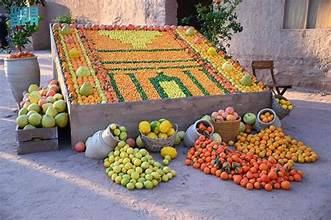- Advertisement -
ISLAMABAD, Jan 27 (APP):The third edition of the Citrus Festival kicked off in Taxila, showcasing a vibrant blend of agriculture, art, and culture, while highlighting the region’s rich agricultural history and the growing challenges faced by citrus farmers.
Organised by the Gandhara Resource Center Pakistan (GRCP), the event was launched by Team Leader Sarah Mehmood, the other day, who welcomed participants from various sectors to celebrate the festival’s continued success since its inception in 2023.
Sarah Mehmood in her welcome address said that the festival, which began as an initiative led by Nadeem Omar Tarar, Executive Director Center for Culture and Development (C2D) and his partners, has grown to become a cornerstone of Taxila’s agricultural and cultural identity, drawing support from a wide range of prestigious partners, including PTCL-Ufone, Agri Tourism, Haripur University, HITEC University, HIT, Green Tourism, ACM group, CHRS, District Haripur Administration, Green House, Taxila Baithak, and Hamari Baithak.
Mehmood praised the event’s evolution, stressing the importance of preserving the region’s citrus heritage and its cultural ties to the Gandhara civilization.
“The Taxila and Gandhara heritage, along with the rich agricultural history of Haripur, are key pillars of our identity,” said Mehmood. “This event not only celebrates the citrus industry but also brings to light the challenges farmers face today.”
A central focus of the festival was the preservation of Taxila’s heritage and the significance of citrus farming in the region.
Haripur, once home to vast citrus orchards, now faces threats from encroaching housing societies, making it critical to raise awareness about the ecological importance of these farmlands. This year, the festival attracted farmers to the forum, providing them with a platform to discuss challenges such as water scarcity, poor crop yields, and market access.
Chief Guest, Yousaf Ayub Khan, former Member Provincial Assembly Khyber Pakhtunkhwa praised the festival’s role in preserving agricultural heritage while condemning the expansion of housing societies onto agricultural land.
Khan referred to the work of Col. Wacefield, a British Army officer who introduced citrus farming to the region in the early 1930s, and reiterated the need for policies to protect farmland from real estate development.
He also highlighted the University of Haripur’s discovery of the second largest sleeping Buddha in Pambala, which is being preserved with an allocation of Rs. 100 million.
Dr. Waseem, an expert in citrus cultivation, shared insights into the sector’s growth, noting that citrus has become a major export product for the region, particularly to the Middle East.
However, he also highlighted pressing issues like reduced water supply during peak months and the impact of chemical fertilizers on fruit quality. “We are working on developing a state-of-the-art nursery with 10 varieties of citrus to help sustain our orchards,” said Dr. Waseem. “We are also focused on value addition initiatives, which will help our farmers realize the full potential of their produce.”
Zahid Mehmood, of Kisan Ki Dukan (KKD) initiative, emphasized the importance of cutting out intermediaries in the market, advocating for direct connections between farmers and consumers.
“Our mission is to help farmers get fair prices for their produce, empowering them to thrive without the exploitation of brokers,” Mehmood remarked.
The festival also featured a remarkable documentary on citrus farming by GRCP, alongside an art exhibition showcasing local talent.
The exhibition included live painting sessions and a pavilion dedicated to stone craft, providing a cultural touch to the event.
Zafar Thathal, a farmer promoting organic agriculture, emphasized the importance of traditional, pesticide-free farming practices for both environmental sustainability and food security. “Our goal is to promote organic farming methods, which are healthier for the land and the people,” Thathal said.
The event concluded with the awarding of prizes to winners of the art competition, followed by a speech by Syed Ajmal, Additional General Manager at Habib Bank, who expressed the bank’s commitment to supporting farmers through tailored financial solutions.
In a significant initiative, Irum Fatima, President of Hoslamand Khawateen Network Pakistan, discussed rural women’s empowerment through agriculture and pledged to continue supporting women in rural communities.
A heartwarming moment came with a special tableau presented by students from Baseerat High School, featuring a performance by children with special needs, under the guidance of their mentor Malik Shahid Suleman.
With its rich cultural, agricultural, and community-driven approach, the Citrus Festival once again proved to be a resounding success, highlighting both the challenges and the immense potential of Haripur’s agricultural industry and its preservation of natural heritage.

